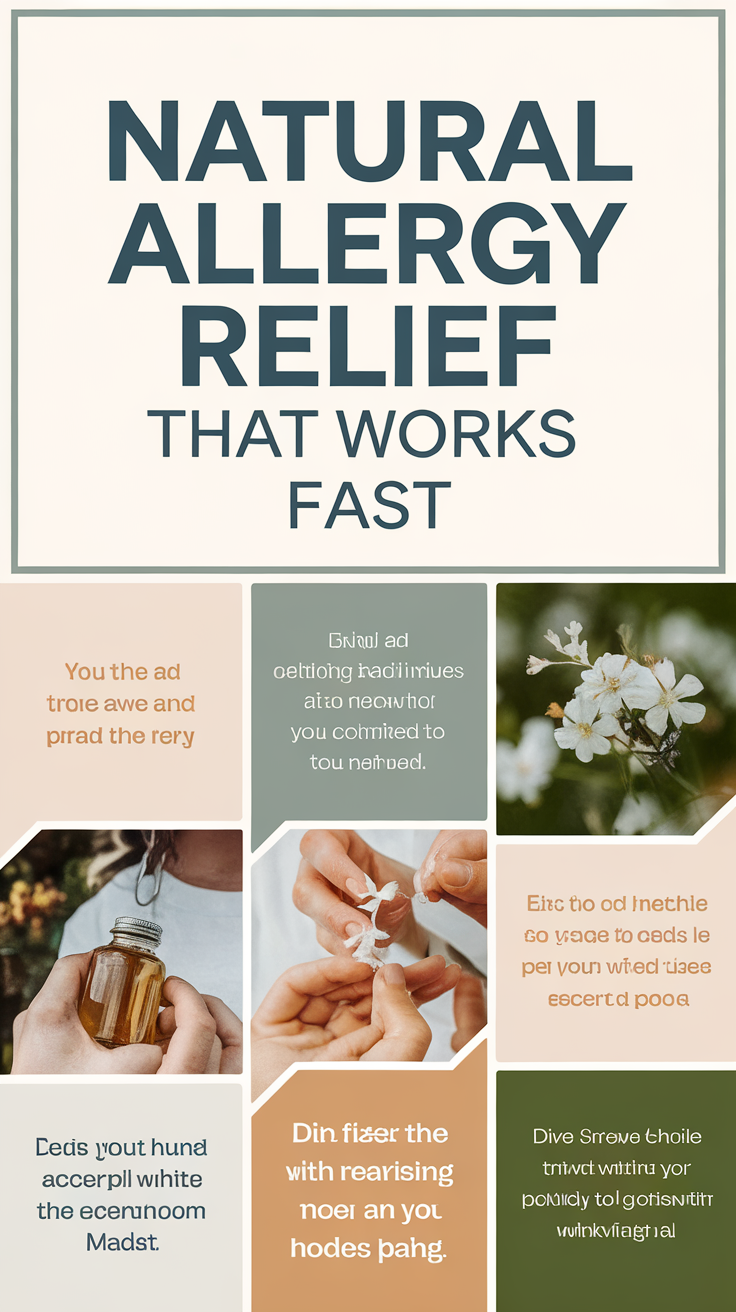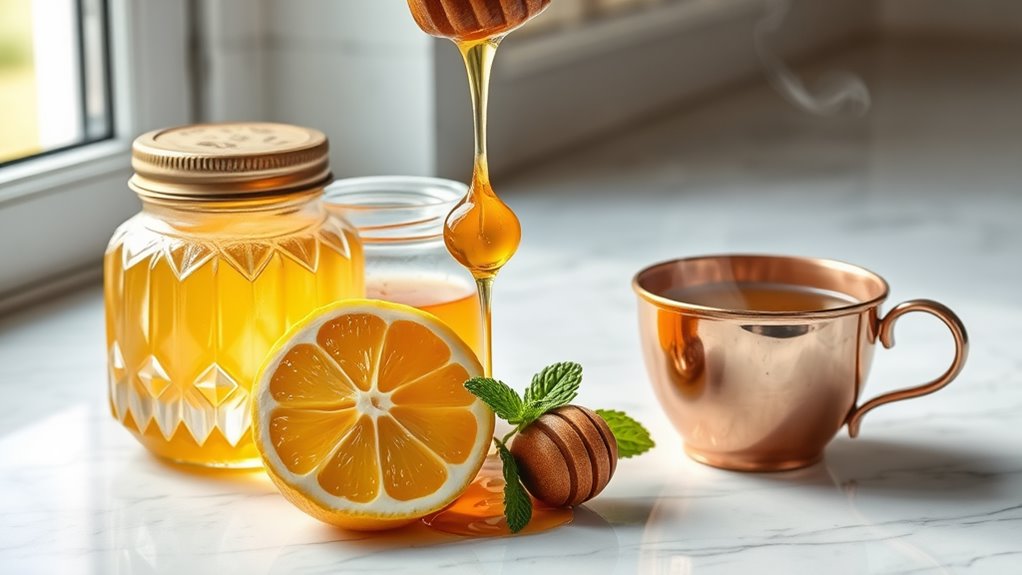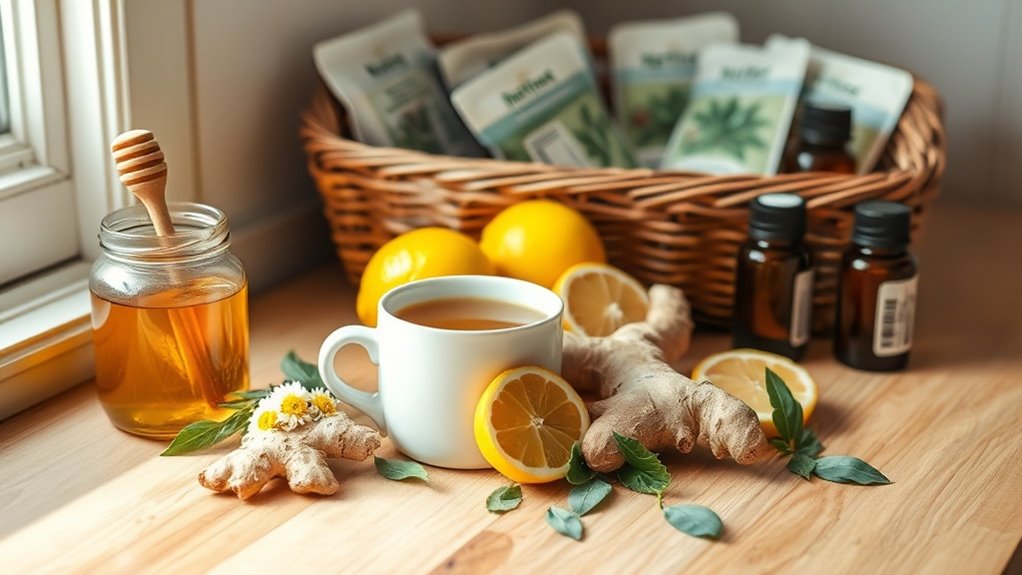Natural Allergy Tips That Make a Difference for Me
To manage your allergies naturally, start by vacuuming with a HEPA filter weekly and dusting with damp cloths to minimize allergens. Incorporate anti-inflammatory foods like citrus fruits and leafy greens into your meals. Consider nasal irrigation to flush out allergens and improve your nasal health. Herbal supplements like spirulina and butterbur may provide relief as well. Keep your home pollen-free by closing windows during peak times. You’ll find even more practical tips to enhance your allergy management.
Effective Indoor Allergen Reduction Strategies
To effectively reduce indoor allergens, you’ll want to employ a combination of practical cleaning strategies and environmental controls.
Start by vacuuming carpets and upholstery weekly with HEPA-filter vacuums to trap allergens. Dust surfaces with damp cloths to prevent particles from becoming airborne, and mop hard floors with microfiber to capture hidden dust. Maintaining a clean and controlled indoor environment is crucial for reducing allergens. Maintain indoor humidity below 50% using dehumidifiers and install exhaust fans where needed. Additionally, encase your mattress and pillows in allergen-proof covers and consider using HEPA air purifiers. Air spreads allergens, which highlights the importance of maintaining a clean and controlled indoor environment.
Following these allergy remedies will significantly improve your indoor air quality and help you breathe easier at home.
Dietary Changes for Allergy Relief
When it comes to finding relief from allergies, dietary changes can play a crucial role in managing your symptoms. Incorporating certain foods can help reduce inflammation and boost your immune system. Try adding these foods to your diet:
| Anti-Inflammatory Foods | Foods to Avoid | Quick Tips |
|---|---|---|
| Citrus fruits | Spicy foods | Start your day with green tea |
| Leafy greens | Fermented foods | Snack on berries |
| Omega-3 rich fish | Processed foods | Add probiotics regularly |
Foods high in vitamin C may also contribute to reducing allergy symptoms effectively. To enhance your diet further, consider incorporating natural antihistamines like quercetin that can stabilize mast cells and effectively block histamine production.
The Benefits of Nasal Irrigation
Integrating nasal irrigation into your daily routine can be a game-changer for managing allergy symptoms. By flushing out allergens and improving nasal moisture, it acts as a preventive measure against potential flare-ups. You’ll find that simple consistency can lead to lasting relief and a better quality of life. Regular use of neti pots has also been shown to effectively treat congested sinuses and enhance overall nasal health. Additionally, using a neti pot with saline solution can help remove excess mucus and irritants, providing even more relief from nasal congestion.
Daily Routine Integration
Regularly incorporating nasal irrigation into your daily routine can significantly enhance your respiratory health and overall well-being. By using saline solutions to clear dust, pollen, and mucus, you’ll experience relief from nasal congestion and allergic rhinitis symptoms. A daily rinse not only reduces the need for allergies medication but also improves your quality of life. Additionally, it helps flush out pathogens that may contribute to your symptoms. It’s a simple practice that reinforces your body’s own natural defenses against irritants. Just ensure you use sterile water and maintain proper hygiene of your device. Consistency is key, and soon you’ll notice clearer passages and better breathing, day in and day out.
Preventive Allergy Measures
Nasal irrigation offers more than just daily relief; it’s a potent preventive measure against allergens and irritants that can disrupt your comfort and well-being. Here are some key benefits:
- Allergen Removal: It effectively flushes out pollen and dust, minimizing allergic reactions.
- Sinus Infection Prevention: Regular rinsing helps clear mucus, reducing your risk of infections. This technique can lead to over 60% improvement in symptom severity for individuals with chronic sinus issues.
- Medication Reduction: You may find you need fewer allergy medications, improving your quality of life.
Incorporating nasal irrigation into your routine can enhance your overall respiratory health, providing a simple yet powerful tool for allergy management.
Herbal Supplements That Help
If you’re seeking natural relief from allergy symptoms, several herbal supplements can offer effective support.
Spirulina, with its antioxidant properties, may outperform traditional antihistamines in alleviating congestion.
Butterbur, a non-sedating alternative, works similarly to over-the-counter medications, while stinging nettle shows potential in blocking histamine.
Phleum pratense pollen extract can help desensitize you to grass pollen, and curcumin may reduce nasal congestion.
Although some herbs like garlic have anecdotal support, more research is needed.
Butterbur root extract has been recognized as a natural solution for allergy relief by many users, making it a well-regarded option to consider.
Always consult a healthcare professional to discuss the best options for your specific needs, ensuring safety and effectiveness in your allergy relief journey.
Creating a Pollen-Free Home Environment
How can you transform your home into a sanctuary from pollen?
By implementing a few simple strategies, you can drastically reduce allergens and breathe easier. Start with these essential tips:
- Keep windows closed during peak pollen times to prevent outdoor allergens from sneaking in.
- Invest in HEPA filters for your vacuum and air purifiers, which capture pollen efficiently.
- Regularly clean surfaces with damp cloths to trap dust and prevent pollen from circulating.
Additionally, consider starting a regimen of local honey six weeks before allergy season to help build tolerance to pollen.
Follow these steps, and you’ll create a welcoming, pollen-free environment that allows you to enjoy your time indoors without worry.
Exploring Alternative Therapies for Allergies
When managing allergies, exploring alternative therapies like acupuncture and essential oils can be beneficial. Acupuncture may help reduce inflammation and improve your body’s response to allergens, while essential oils can provide soothing relief. Additionally, regular consumption of local honey can strengthen your immune system and potentially lessen allergic reactions over time.
Acupuncture Benefits for Allergies
Acupuncture offers a unique and promising approach to managing allergies, particularly for those seeking relief from persistent symptoms.
This traditional therapy not only alleviates discomfort but also addresses underlying issues.
Here are some key benefits you might find compelling:
- Reduces IgE levels, lessening allergic reactions.
- Enhances nasal mucosa defenses, keeping allergens at bay.
- Improves overall quality of life, particularly with allergic rhinitis.
With its ability to reduce inflammation and modulate immune responses, acupuncture can complement your existing allergy treatments.
Always consult with a professional to ensure it’s right for you, and explore this holistic option for greater symptom relief.
Essential Oils for Relief
Essential oils offer a natural and aromatic way to ease allergy symptoms, providing a refreshing alternative to traditional treatments.
Lavender oil calms sneezing and itchy eyes, while frankincense reduces airway inflammation.
Sandalwood soothes nasal passages, and ravensara clears congestion.
Peppermint promotes easy breathing.
You can diffuse oils, apply them topically, or even inhale directly for quick relief.
Blending sandalwood, frankincense, and ravensara can be especially effective.
Just remember to dilute oils for skin use and check for quality.
With essential oils, you might find the relief you’ve been searching for in your allergy journey.








